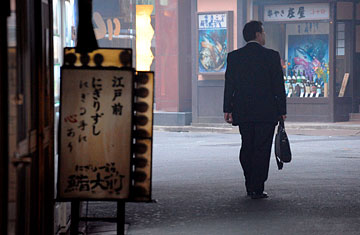
A Japanese pedestrian walks under railway tracks in downtown Tokyo on Nov. 17, the day the nation announced it had officially entered a recession
It's official. On Nov. 17, Japan's government declared that the second largest economy in the world had slipped into recession for the first time since 2001. The Cabinet office of Prime Minister Taro Aso said that gross domestic product had contracted at an annual rate of 0.4% in the three months up to September, its second consecutive quarter of negative growth.
The unwelcome news comes as little surprise. For months, newspapers have been awash with ways consumers can "return to the home" to protect themselves against the economic downturn — suggestions range from buying a pasta maker rather than going out for Italian, to entertaining the kids with board games rather than spending on family outings.
But the frugality that has gripped Japan in recent months might be part of the problem. Analysts see it as symbolic of a deep-rooted pessimism held by the Japanese public, evidenced by abysmally low consumer confidence and the subsequent shuttering of thousands of small- and medium-sized businesses this year. Even if the recession Japan now faces ends up less bad than those in the U.S. and Europe — as some say it might be — the grim consumer outlook has the potential to put off a full recovery. (Vote for your Person of the Year.)
Japan's minister for economy, trade and industry, Kaoru Yosano, summed it up on Monday when he said, "Japan is in a very serious situation." Last month, as the nation's export-driven economy watched global demand slow down, Japan's Nikkei index fell to a 26-year low. Couple this with the appreciation of the yen — which some economists say could strengthen to an exchange rate of 80 to the dollar by the end of next year — and it's little wonder that corporate powerhouses like Toyota, Honda and Sony have seen profits dive. Royal Bank of Scotland Japan chief economist Junko Nishioka says that over the past two months, she has grown increasingly pessimistic. She sees Japan recording at least two years of negative growth, the first time that has happened since the property and banking bubbles burst in the late 1980s, leading to Japan's so-called Lost Decade. With weak export and domestic demand, she says, there is "no positive driver in the Japanese economy, if you think about the two-year horizon."
Some predict Japan will fare marginally better in its recession than the U.S. or the Eurozone. The Organization for Economic Co-Operation and Development (OECD) projects that 2009 GDP will grow 0.1% in Japan, compared with 0.9% in the U.S. and 0.5% across the Eurozone. "Financial-debt-to-GDP ratio is an advantage, and debt in the private sector has not increased, unlike in the U.S. and European countries," says Hiromichi Shirakawa, chief economist at Credit Suisse Japan. "The economy is less vulnerable." Nevertheless, he says, Japan is not an island: nothing points to an economic recovery in Japan unless the global economy picks up. According to Andreas Schuster, head of research at CLSA, a private-equity firm based in Hong Kong, "It won't be pretty, but it will be less tough than in the Western economies." (See pictures of the global economic crisis.)
But economists and analysts worry that the dearth of consumer confidence, despite a low unemployment rate of about 4%, could weigh heavily in the long run. "A negative view of the world is more ingrained here," says Schuster. "People are more prepared to think that this downturn will last." Shirakawa says the mind-set of the Japanese public, which he calls structural pessimism, is, "Oh, it's a recession again" — a sentiment learned from the trials and tribulations faced during the Lost Decade. There is no easy solution to this endemic lack of confidence, he says; it requires different policy solutions than what Western economies require. "We did a lot in terms of capital injection, recapitalization, public investment, tax cuts — everything. We were ahead of the curve, front-liners," he says. "We have success in stabilizing the economy, but have continuously failed in recovering the economy."
As part of a $275 billion stimulus package announced Oct. 30, Tokyo wants to pump households with about $600 for each family of four — a plan that has faced criticism for being insufficient and indecisive regarding who should receive the benefits. "Even if the voucher goes to the households, given the propensity of household consumption, the impact on overall GDP will be very limited," says Nishioka. Says Shirakawa: "People don't want to spend money, even if they get it from the government. Economic reforms are important, but the government needs to make people more comfortable and more confident in efficient government. It's a tough situation." Japan can only hope that its consumers will start to adopt a slightly sunnier outlook, and soon.
